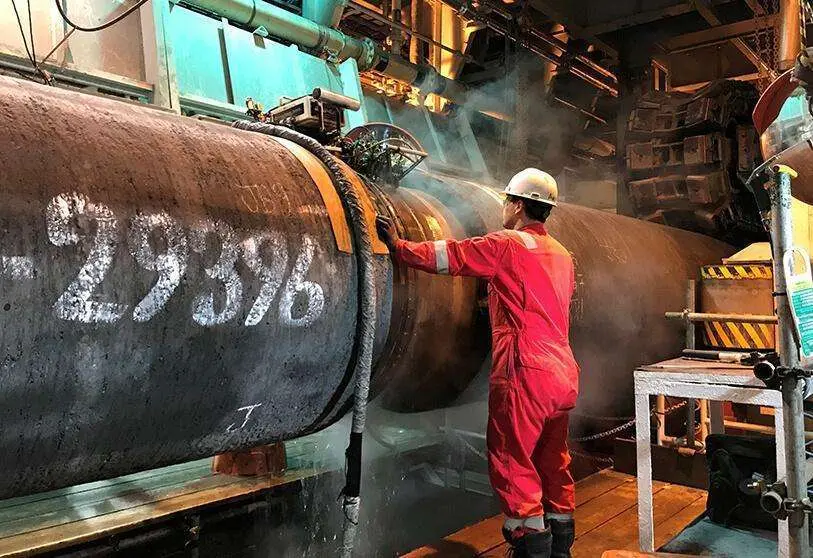La tensión entre Marruecos y Argelia pasa factura al gas

The breakdown in relations between Algeria and Morocco could claim its first victim after Algiers hinted that it will cut off the gas pipeline that has been supplying Spain for 20 years through Moroccan territory this October, a situation in which all three countries will lose out, albeit to different degrees.
On 24 August Algeria broke off relations with Morocco - with whom it has a long-standing rivalry - and two days later announced that it wants to take all the gas it supplies to Spain through the Medgaz pipeline, hinting that it is ruling out the other pipeline, the Maghreb-Europe Gas Pipeline (GME), which runs through Moroccan territory.
The GME is a pipeline more than 1,400 kilometres long that begins in the Algerian field of Hassi R'mel, crosses Moroccan territory for some 540 kilometres and crosses Gibraltar in an underwater section of some 45 kilometres before reaching Cadiz. It transports an annual average of 10 billion cubic metres to the mainland.
Meanwhile, Medgaz, which is more than 750 kilometres long and directly connects the Algerian field with Spain (Almeria), came into operation in 2010 and has a capacity of 8 billion cubic metres, but Algeria recently announced that it had increased its capacity by 25% in order to be able to respond to Spanish demand.

According to several experts, the replacement of GME by Medgaz announced by Algeria is politically motivated and seeks to harm its neighbour to the west, but specialists warn that it will be costly not only for Morocco, but also for Algeria and Spain.
Rabat has not yet officially reacted to Algeria's announcement, and the country's local press has played down its impact, considering that Morocco is only 5 per cent dependent on gas for its raw energy supplies: "Algeria cuts off gas... so what? So what?" headlined the Moroccan daily L'Economiste this week.
According to experts consulted by the EFE news agency, Morocco could face gas supply problems if it does not find alternatives in the short term, given that almost all the natural gas it consumes comes from Algeria.
Morocco charges around 600 million cubic metres for the rights of passage of GME gas through its territory, which feeds two important power plants: Tahaddart (in the northern region of Tangier) and Ain Beni Mathar (in the eastern region of Oujda). Both contribute nearly 12% of the electricity consumed in the Maghreb country.
This situation also comes at a time when Morocco is counting on increasing its natural gas supplies because it is cleaner and more competitive, and to gradually replace coal. The Moroccan energy ministry predicted last month that national demand will reach more than 3 billion cubic metres by 2040.

According to analyst Gonzalo Escribano, Director of the Energy and Climate Programme at the Elcano Royal Institute, one of Morocco's solutions after 31 October if the GME contract, which expires on that date, is not renewed, is to reverse the direction of this pipe in the section that connects Morocco with Spain so that the latter supplies natural gas to the Maghreb country from other suppliers.
However, Escribano believes that the best solution is for the parties to cooperate and for Spain to negotiate with Algeria a possible gradual closure of the GME in order to find alternatives and test the effectiveness of the Medgaz. "(The GME) is an element of functional strategic cooperation that benefits all parties," the Spanish analyst told EFE.
Moroccan economist Rachid Aourraz, of the Moroccan Institute for Policy Analysis (MIPA), shares the same idea, believing that the possible cessation of the GME "will put an end to the opportunity to advance economic integration" in this Mediterranean region.

The experts explain that, although Algeria and Spain appear to be more prepared for the cut-off of the GME, they could end up being disadvantaged. By making gas deliveries dependent on a single pipeline instead of two, Algeria would limit its options to deal with technical incidents if they arise and reduce its chances of responding to a rapid increase in demand. All this in a global context marked by the change in trade policy of Russia and the United States that is prioritising Asia, as well as by a possible energy crisis looming in Europe this winter.
As for Spain - where 30% of its gas needs come from Algeria and where in recent months there has been a decrease in the stored level of liquefied natural gas (LNG) - Escribano believes that a supposed reduction in the quantities of gas supplied in the face of a possible strong increase in demand could make the prices of this raw material even more expensive. "We consumers end up paying for the political problems," laments Escribano.








